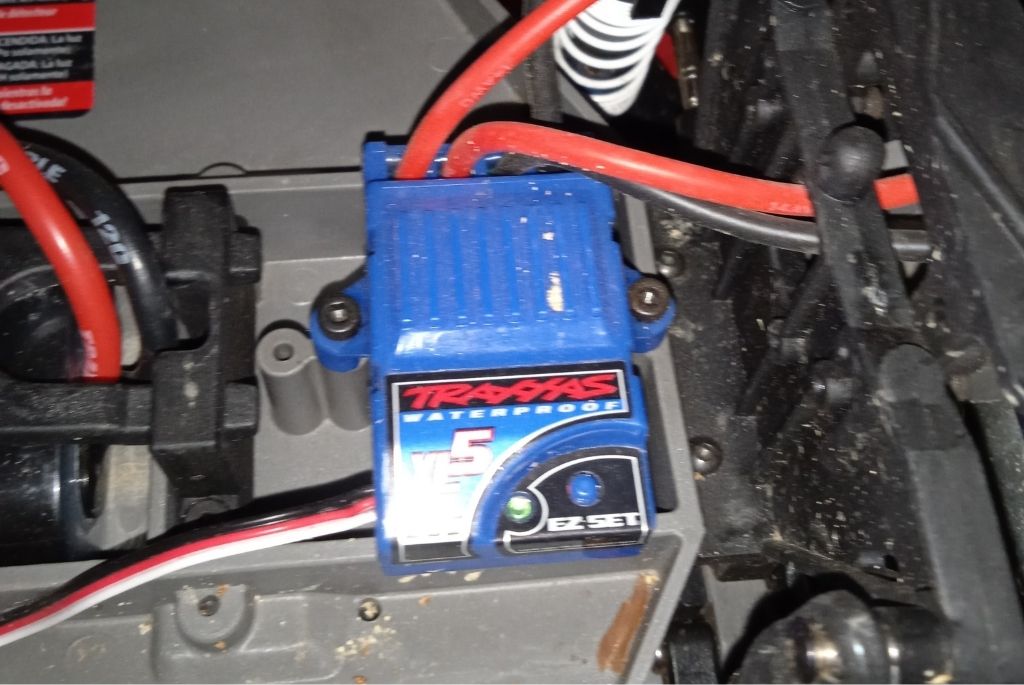Getting into the RC hobby means that you will need to learn a little about electronics and circuits to understand how your RC vehicle works. This knowledge will help you diagnose problems occurring in your RC vehicle and prevent wasting money replacing the wrong parts. The ESC is one such part that requires understanding and whether it can burn up RC motors.
A bad or faulty ESC can burn up an electric RC motor. The ESC is an electronic speed control for electric motors. The circuitry in the ESC can fail and allow large voltages and currents to flow through to the motor connected to the ESC. These voltage and current spikes can burn out the motor.
Turning in your RC vehicle only to see smoke coming out of the motor or the ESC, or both can be a disheartening sight. Nobody would blame you for feeling like your RC vehicle is doomed to never run again! Learning a little about the electronics in the vehicle, especially the ESC and the motors, can help you diagnose these problems and replace parts to get your RC vehicle running sweetly again!

Can A Faulty ESC Burn Up An RC Motor?
Components in a circuit are all connected in a closed system which implies that when one component is not functioning correctly or is faulty other components will be affected.
A faulty component can do one of three things to the circuit when it develops a fault.
- The faulty component can break the circuit, preventing the flow of electricity.
- The faulty component could function erratically, causing other components to become damaged.
- The faulty component can function erratically for a few milliseconds or seconds, damaging other components before burning out completely and breaking the circuit.
Any of the components in the circuitry can fail and cause these problems, but the propensity for the faulty component to cause damage to other components depends on the intended function of the faulty part.
What Does The ESC Do In An RC Circuit?
The Esc is a circuit board with various components connected that allow the electronic control of the motor or motors connected to the ESC.
ESC stands for Electronic Speed Control, and the components on the circuit board are to control the connected motor. The way the ESC performs this function is to control the voltage and amperage going to the motor.
Related post: 13 Reasons Why RC motors And ESC’s Burn Up
ESC circuit boards regulate the voltage and current going to a motor to make sure that the voltage is steady, adjust the voltage to regulate the speed of the motor, provide braking functions for the motor, or reverse the motor.
In drones, the ESC unit controls the voltage delivered to each motor to control the speed of each motor and keep them spinning at correct speeds to provide control of the drone.
In RC cars and trucks, the ESC unit provides varying voltage to control the speed of the motor, provide a braking function and reverse the polarity to allow the motor to operate in reverse.
In RC aircraft, the ESC maintains constant voltage to avoid fluctuations in power, leading to erratic flight and difficulty in controlling the aircraft.
How Can The ESC Damage A Motor?
As we have discovered, the ESC has control over voltage and current levels supplied to the motor for control and smooth operation of the motor.
A malfunctioning ESC can allow high voltages and spikes of current to flow through the circuitry to the motor. If these levels are higher than what the motor is rated for, the additional voltage or current can overheat the motor, which can damage the motor or cause it to burn out.
Because the ESC unit can increase or decrease electricity flow to the motor, a malfunctioning ESC can allow high current and voltages to pass through to the motor.
These high voltages can overload the wiring and circuitry in the motor, causing the wiring to burn. This is what generates the smoke coming from the motor when its wiring is overloaded. If the electricity to the motor is not cut quickly, the damage done to the wiring inside the motor can destroy the motor completely, rendering it useless.
Related post: Fixing A Smoking RC Car- A Simple Guide
The problem with this type of fault is the problem appears to come from the motor itself because of the heat and smoke generated emanating from the motor.
Those who don’t know to check the ESC, assume the motor was at fault, and buy a new motor to replace the old one. They connect the new motor to the faulty ESC, and the first time they switch the vehicle on again, the ESC burns out the brand-new motor.
Experienced RC vehicle operators know that when a motor fails and needs replacement, you should view the ESC with suspicion and check it for faults before installing a new motor and run the risk of destroying the new motor as well.
Not all faults on an ESC will damage the motor, but a faulty Esc can also result in a twitchy or stuttering motor or a motor that won’t spin up to full speed.
(Amazon link)
How To Detect A Faulty ESC
There are some complicated methods you check your Esc, and you can get into very complicated repair endeavours such as replacing the MOSFETs themselves on the ESC. However, what interests you more is the driving or flying of your RC vehicle than electronics, you can perform this simple test to establish if your ESC is damaged.
This test will check for a short circuit within the ESC but will not diagnose all ESC faults, only ones that may damage the motor. The ESC could also have a fault where the circuit is broken rather than shorted out, and this test will not give you this diagnosis.
To test for a short in the ESC that could damage the motor or cause it to run erratically, you will need a multimeter capable of testing for continuity with an audible beep.
The best way to perform this short circuit test is with the motor disconnected since the motor could give a false reading.
With one multimeter lead connected to the positive terminal of the ESC, touch the other multimeter lead to each of the motor connector pads on the ESC.
Repeat the process by connecting one of the multimeters leads to the negative terminal of the ESC and touching the other lead to each of the motor connectors.
If you hear an audible beep from the multimeter with any of these tests, it indicates a short circuit within the ESC, and the Esc will need to be repaired or replaced.
For more on checking for a faulty ESC, take a look at my article: How To Tell If Your ESC Is Bad
Conclusion
You do not need to become an electronics engineer to enjoy RC vehicles, but understanding how the electronics work and the ability to perform basic testing can help you in the hobby.
Acquiring the knowledge of how to do these basic tests can save you hours of frustration not knowing where the problem lies and save you money by preventing unnecessarily burning out new components.
While we all want to have a problem-free RC experience, problems are bound to occur. Knowing how to fix these issues yourself brings another level of achievement and satisfaction to the RC hobby!
Check out my article: Traxxas ESC Blinking Red: Reasons & Troubleshooting Guide!
